AP scores can play an important role in college admissions, helping students earn credit, fulfill prerequisites, and even save on tuition by placing out of introductory classes. In this guide, we’ll break down everything you need to know about AP scores, from score interpretation to how they’re reported.
Whether you’re aiming for a top score or just curious about the benefits, understanding your AP results is essential. If you’re in Dubai, UAE, Ignite Training Institute offers comprehensive AP tutoring support to help you reach your academic goals.
Table of Contents
- What Are AP Scores?
- How Are AP Exams Scored?
- How Much Is AP Scores Out Of?
- What Is The Average Score For AP Exams?
- Can You Choose Which AP Scores To Send?
- How To Send AP Scores To Colleges & Universities?
- How To Find Out If You Have Earned An AP Award?
- How Can You Let Colleges Know That You Won An AP Award?
- How Do Students Benefit From AP Exam Scores?
- Where To Check AP Scores? A Step-By-Step Guide
- How AP Scores Affect College Credit & Admissions
- How Can You Get My AP Scores From Years Ago?
- Ignite Training Institute: Best AP Computer Science Tutors In Dubai
- FAQs
- Conclusion
What Are AP Scores?
AP scores are the results of standardized tests administered by the College Board to high school students who have completed Advanced Placement (AP) courses. These exams assess students’ knowledge and skills in various subjects, ranging from mathematics and science to history and language arts.
AP scores are reported on a 5-point scale, with a score of 5 indicating the highest level of achievement and a score of 1 indicating the lowest.
Colleges and universities often use AP scores to determine whether to grant students college credit or advanced placement in specific courses. A higher AP score generally increases a student’s chances of receiving credit and placement, potentially allowing them to skip introductory courses or graduate early.
Related: IB VS AP: Which Is Better For Admissions In Top Colleges
How Are AP Exams Scored?

The Advanced Placement (AP) exams, administered by the College Board, are an essential part of the AP program, offering high school students the opportunity to earn college credit and demonstrate their academic prowess. Understanding how AP exams are scored can help students better prepare for these exams and manage expectations.
Here’s a breakdown of the scoring process:
1. Multiple-Choice Section
AP exams typically consist of multiple-choice questions designed to assess students’ knowledge and critical thinking skills. Each correct answer on the multiple-choice section earns the student one point.
There is no penalty for incorrect answers, so students are encouraged to answer every question. For exams with both multiple-choice and free-response sections, the multiple-choice portion typically accounts for about 50% of the total score.
2. Free-Response Section
The free-response section of the AP exam varies by subject but often includes essays, problem-solving tasks, or other forms of written response. These sections are designed to test a student’s ability to apply knowledge in more complex scenarios.
Each free-response question is scored on a scale from 0 to 9 (or sometimes from 0 to 6, depending on the exam). Responses are graded by AP exam readers, who are usually college professors or experienced high school teachers.
3. Score Calculation
Once the multiple-choice and free-response sections are scored, the raw scores from both sections are combined to give a total raw score. This raw score is then converted to a standardized AP score using a process called scaling.
The scaling process ensures fairness across different exam versions, since questions may vary slightly in difficulty. For instance, a student might need to answer fewer correct questions on a more difficult test to achieve the same scaled score as someone taking an easier version of the exam.
4. AP Score Scale
AP exam scores are reported on a scale from 1 to 5:
- 5: Extremely well qualified – equivalent to a top-tier college performance
- 4: Well qualified – indicates strong college-level performance
- 3: Qualified – suggests a student is capable of handling college-level coursework
- 2: Possibly qualified – suggests the student may need additional preparation for college-level work
- 1: No recommendation – indicates a student is not prepared for college-level coursework
5. Scoring Differences By Subject
While the process is generally the same for all AP exams, the weight given to each section may vary slightly depending on the subject. For instance:
- AP English Exams (like AP English Literature and Composition) may place greater emphasis on the free-response section, where essay-writing skills are crucial.
- AP Calculus and other math/science exams often weigh the multiple-choice section more heavily, as they focus on problem-solving and calculation skills.
6. Reporting AP Scores
AP scores are typically released in July, about two months after the exams are taken. Students can access their scores through the College Board’s AP Portal. The scores are sent to colleges and universities, and students can choose to send their scores to as many institutions as they wish.
Many colleges offer credit or advanced placement for students who score well on AP exams, with a score of 4 or 5 generally qualifying for college credit.
7. Important Notes
- Score Reporting: You can choose which scores to send to colleges. AP scores are not averaged over multiple years, so sending only your best scores can be a strategic decision.
- Retaking Exams: If you’re unhappy with your AP score, you can retake the exam the following year, though some colleges may only consider the highest score.
Related: All About AP Exams 2025 Explained: A Detailed Overview
How Much Is AP Scores Out Of?
AP (Advanced Placement) scores are graded on a scale from 1 to 5. This scoring system is designed to assess how well students have mastered the material in AP courses and exams.
Here’s a breakdown of what each score means:
- A score of 5: Extremely well qualified. This is the highest possible score and indicates that the student has an excellent understanding of the subject matter and is well-prepared for college-level coursework.
- A score of 4: Well qualified. A score of 4 shows that the student has a solid grasp of the subject, and many colleges may award credit or advanced placement based on this score.
- A Score of 3: Qualified. This score suggests that the student has a good understanding of the subject, and some colleges might offer credit or placement, though it’s more selective.
- A score of 2: Possibly qualified. This score indicates some knowledge of the subject, but may not be sufficient for credit or advanced placement in most colleges.
- A score of 1: No recommendation. A score of 1 means that the student did not demonstrate a sufficient understanding of the material.
Related: The Difficulty of AP Exams & Classes: What to Expect
What Is The Average Score For AP Exams?
The Advanced Placement (AP) exams are an important milestone for high school students who are aiming to earn college credit or placement. Understanding what constitutes an “average” score on these exams can help students gauge their performance and set realistic goals.
So, what is the average score for AP exams, and how is it calculated?
AP Exam Scoring Overview
AP exams are scored on a scale from 1 to 5:
- 1: No recommendation (lowest score)
- 2: Possibly qualified
- 3: Qualified (typically the minimum score for earning college credit)
- 4: Well qualified
- 5: Extremely well qualified (highest score)
A score of 3 or higher is generally considered a “passing” score and may qualify a student for college credit, depending on the college or university’s policies.
What Is The Average AP Exam Score?
While the average score can fluctuate year to year depending on various factors, the general trend is as follows:
- The average score for AP exams typically hovers around 3.0. This means that, on average, students perform at a level considered “qualified” (a score of 3), which aligns with the expectation for college-level readiness.
- However, it’s important to note that the average score varies by subject. Some AP subjects tend to have higher average scores due to the nature of the material or the students who typically take them. For example:
- AP English Language and Composition often has an average score of around 3.5.
- AP Calculus AB averages closer to 3.3.
- AP Biology averages around 3.0.
Factors That Affect The Average AP Score
Several factors contribute to the variability in average AP scores:
- Subject Difficulty: AP exams like AP Chemistry or AP Physics tend to have lower average scores due to the challenging material. Meanwhile, subjects like AP Psychology might see slightly higher average scores because of its more approachable content.
- Student Preparation: The level of preparation and experience students have before taking an AP exam can significantly impact their scores. Students who take AP classes regularly and have access to resources such as study guides or review courses tend to score higher.
- Test-Taking Trends: As more students take AP exams, especially those who may not have completed the associated AP course, the overall average score may shift slightly lower. Conversely, when more highly prepared students take AP exams, the average may increase.
Related: A Complete Guide To What Is An AP Seminar Exam
Can You Choose Which AP Scores To Send?
When sending AP scores to colleges, students can generally choose which scores to send, but with some important details. The College Board includes all AP scores in the report by default when you send scores to colleges. However, you can withhold or cancel specific AP scores if you don’t want them included in the score report.
To withhold a score, you must submit a request form to the College Board. Withholding a score keeps it out of the score report sent to colleges, but the score remains in your record and can be sent later if needed. If you want to permanently remove a score, you can cancel it. Once canceled, the score is erased and cannot be restored or sent later.
These options provide flexibility, allowing you to decide which scores represent your best work while keeping others private. However, remember to check each college’s specific policies, as some might have different preferences for how they view withheld or canceled scores.
Related: Do AP Classes Count As College Credit? All You Need To Know
How To Send AP Scores To Colleges & Universities?
To send your AP scores to colleges and universities, you’ll need to go through the College Board’s official reporting system. Here’s a quick guide on the steps and options available to you:
- Online Requests: Log into your College Board account and select the colleges or universities you want to receive your AP scores. You can request score reports online any time after taking the AP exams.
Each score report sent through standard delivery costs $15 and takes about 7–14 business days, while rush delivery costs $25 and takes about 5–9 business days to reach the college.
- Sending Scores by Mail or Fax: If you prefer, you can also mail or fax a written request. Include your full details (name, address, AP number, exam details, etc.) and specify the recipient college(s).
Send the request to the College Board’s designated mailing address or fax number. Similar fees apply: $15 for standard and $25 for rush delivery.
- Withholding or Canceling Scores: If there’s a score you’d rather not share, you can withhold it from specific colleges for $10 per score per college. Alternatively, you can permanently cancel a score (at no additional cost), which removes it from all future reports to any institution.
Make sure to complete cancellations by June 15 if you want to avoid sending the score to the college listed on your AP answer sheet.
- Self-Reporting Scores: Many colleges allow you to self-report your AP scores directly on applications (like the Common App) or through your high school transcript. Self-reporting can be a more affordable option but check with each college’s admissions guidelines, as some may require official reports for credit or placement purposes.
Planning your AP score submission early can help you meet deadlines and avoid rush fees. You can find more detailed information and options on the College Board’s website.
Related: Top 5 Easiest AP Exams: A Guide to Achieving Success
How To Find Out If You Have Earned An AP Award?
Earning an AP (Advanced Placement) award is a significant academic achievement that recognizes your hard work and dedication to mastering college-level courses while still in high school.
Whether you’re looking to find out if you’ve earned an AP Scholar award or any other AP-related honor, here’s a step-by-step guide on how to check and understand the process.
1. Understand The AP Awards Available
The College Board offers several AP awards based on performance in AP exams. Some of the common AP awards include:
- AP Scholar Award: This is given to students who score 3 or higher on three or more AP exams.
- AP Scholar with Honor Award: Given to students who earn an average score of at least 3.25 on all AP exams taken, and scores of 3 or higher on four or more AP exams.
- AP Scholar with Distinction Award: Awarded to students who score an average of at least 3.5 on all AP exams taken and scores of 3 or higher on five or more exams.
- National AP Scholar Award: This is a prestigious award for students who have achieved an average score of at least 4.0 on all AP exams taken and scores of 4 or higher on eight or more AP exams.
Each award has specific requirements based on your AP exam performance, and it’s important to know which award you might be eligible for.
2. Check Your AP Exam Scores
The first step in determining if you have earned an AP award is to check your AP exam scores. You can do this by logging into your College Board account. Here’s how to access your scores:
- Log into Your College Board Account: Visit the College Board website (www.collegeboard.org) and log in using the username and password associated with your account.
- Navigate to AP Scores: Once logged in, navigate to the “AP Scores” section of your account.
- View Your Scores: Your scores for all AP exams you have taken will be listed. The College Board releases AP exam scores in July, so make sure you check your account around that time.
3. Calculate Your Average Score
Once you have your scores, you need to calculate your average score to determine if you qualify for any of the AP Scholar awards. For example:
- To qualify for the AP Scholar with Distinction Award, you need to have an average score of at least 3.5 on all AP exams taken. Add up the scores from all your AP exams, and divide by the number of exams to get your average.
4. Review The College Board’s AP Scholar Recognition Page
The College Board provides a breakdown of the AP Scholar awards and their specific eligibility criteria on their website. After you’ve calculated your average, you can compare your results with the requirements for each award listed on the College Board’s AP Scholar Recognition page.
5. Wait For The Official Recognition Email
Once all AP scores are released and processed, the College Board sends out official notifications to students who have earned AP Scholar awards. This typically happens in the fall, several months after the release of AP exam scores.
You will receive an email or letter that officially recognizes you as an AP Scholar, along with any relevant details about the specific award you earned.
6. Keep Your AP Exam Scores For Future Applications
In addition to receiving an award, it’s important to keep track of your AP scores for future college applications. Many colleges and universities grant credit or advanced standing for AP exam scores, so having a strong AP record can benefit you academically during your college years.
Related: Top 5 Easiest AP Exams: A Guide to Achieving Success
How Can You Let Colleges Know That You Won An AP Award?
To inform colleges about an AP Award you’ve received, here are the main methods:
- Include It In Your College Applications: List the award under the “Honors” or “Achievements” section of your application, especially if using platforms like the Common App. Be sure to include the specific award name and briefly describe its significance, as colleges look favorably on these achievements.
- Use The Score Report: When sending AP scores to colleges, your AP Awards may appear in the score report from the College Board. Awards like the AP Scholar Award, AP Capstone Diploma, and National AP Scholar are automatically included, giving colleges direct confirmation of your accomplishments.
- Request A Certificate: For additional documentation, you can request a certificate from the College Board to have a physical or digital copy, which you could reference if needed in any other parts of your application materials, such as a portfolio or supplemental documentation.
These methods ensure that your AP achievements are visible to admissions committees, showcasing your dedication to challenging coursework and your success on AP exams.
Related: AP Courses & Exams: Complete List For High Schoolers
How Do Students Benefit From AP Exam Scores?
Advanced Placement (AP) exams offer students a unique opportunity to showcase their academic abilities and stand out in the college admissions process. AP exam scores can significantly benefit students in various ways, including:
- College Credit: Many colleges and universities offer college credit for high AP exam scores (usually 3 or higher), allowing students to skip introductory-level courses. This can reduce the time it takes to complete a degree and help students save on tuition fees.
- Advanced Placement in College Courses: Some colleges may place students in more advanced courses based on their AP scores, providing them with a greater challenge and the opportunity to dive deeper into subjects of interest.
- Improved College Applications: High AP scores demonstrate to admissions officers that a student is capable of handling college-level coursework. This can enhance their application, especially for competitive programs and universities.
- Scholarship Opportunities: Some scholarships consider AP exam scores as part of the eligibility criteria. A strong AP score record can help students secure financial assistance for their higher education.
- Development of Critical Skills: Preparing for AP exams helps students develop essential skills like time management, problem-solving, and critical thinking, which are valuable in college and beyond.
- Confidence Boost: Achieving high AP scores can provide students with a sense of accomplishment and boost their confidence in their academic abilities.
Related: AP Exam Test Dates 2025: A Student’s Guide To Strategize
Where To Check AP Scores? A Step-By-Step Guide
Once the AP exams have been graded, students are eager to find out their scores. Here’s how you can check your AP scores:
Step 1: Create Or Log In To Your College Board Account
To access your AP scores, you need to have an account with the College Board, the organization that administers AP exams.
- Create an Account: If you don’t already have an account, visit College Board’s website and click “Sign Up” to create one. Be sure to use your accurate personal details, including your name and email address.
- Log In: If you have an existing account, please log in with your username and password.
Step 2: Navigate To The AP Score Page
- Once logged in, go to the “AP Scores” section on the College Board homepage. There will be a link directing you to view your AP scores.
Step 3: Enter Your AP Number (If Required)
- In some cases, the College Board may ask for your AP number. You can find this number on your AP answer sheet or within any AP exam materials you received before the test. Enter the number when prompted.
Step 4: View Your Scores
- Once you’re on the score page, you will be able to view your scores for all AP exams taken. The scores will be displayed in numerical format (1-5), with a 5 being the highest possible score.
Step 5: Print Or Save Your Scores
- You can print or save a copy of your scores for your records or to share with schools. The College Board also offers a score report that you can send to colleges and universities.
Step 6: Follow Up If Needed
- If you experience issues with your AP scores, or if you don’t receive them when expected, you can contact the College Board’s AP services for assistance. They can offer guidance and assist in resolving any issues.
Related: What Is AP Chemistry Exam? A Student’s Guide To Prepare
How AP Scores Affect College Credit & Admissions
AP (Advanced Placement) scores can play a crucial role in your college application process, influencing both your admission chances and potential college credits. Here’s how:
- Impact On College Admissions:
While AP scores are not typically a deciding factor for college admission, they can enhance your application. Colleges view AP courses as a sign that you are willing to challenge yourself with college-level material. Strong AP scores can show academic excellence and may make you a more competitive applicant, especially for selective colleges. - College Credit:
Many colleges and universities offer college credit for high AP exam scores (usually a 3, 4, or 5, depending on the institution and subject). This means that you could potentially skip introductory courses or fulfill certain general education requirements. This can save time and money, allowing you to either graduate early or take more advanced courses sooner. - Advanced Standing Or Placement:
In addition to earning college credit, some schools may allow you to skip over certain required courses if you achieve high AP scores, thus giving you more freedom to pursue specialized coursework or internships. This can be particularly advantageous if you already have a clear academic path in mind. - Scholarships And Honors:
Some universities may offer scholarships or honors programs to students who have excelled in AP courses, as high AP scores reflect strong academic preparation. Additionally, students with high AP scores may be considered for more prestigious programs or early admission opportunities.
Related: How To Register For AP Exams? Deadline 2024
How Can You Get My AP Scores From Years Ago?
If you’re looking to access your AP scores from years ago, the process is straightforward. You can request your AP scores from the College Board, the organization responsible for administering the exams.
Simply visit the College Board website and log into your account. If you no longer have access to your old account, you can create a new one using your personal details.
Once logged in, you can request a score report for any year, and it will be sent to you or the institutions of your choice. It’s a good idea to have your AP student ID or other identifying information on hand to streamline the process. If you need help or encounter any issues, the College Board provides customer support to assist you.
Related: AP Courses For Engineering: Best Subjects To Prepare
Ignite Training Institute: Best AP Computer Science Tutors In Dubai
Ignite Training Institute offers the best AP Computer Science tutors in Dubai, providing expert guidance to help students excel in the rigorous AP curriculum. With experienced instructors and a focus on personalized learning, Ignite ensures students build strong programming skills and a deep understanding of computer science concepts.
Whether you’re striving for top AP scores or looking to master coding, Ignite is your trusted partner in achieving academic success.
Related: How to Get Good Grades in Biology: 10 Proven Tips
FAQs
1. What Is A Good Score On AP?
A good score on an AP exam is typically a 3 or higher, as it may earn college credit or advanced placement.
2. What Score Is A 5 In AP?
A score of 5 on the AP exam is the highest possible, indicating excellent performance and mastery of the subject.
3. Are AP Scores Out In 2024?
Yes, AP scores for 2024 will be released in July, typically in early to mid-month.
4. Is A Score Of 70 A 5 On The AP Exam?
No, a 70% score on an AP exam does not guarantee a 5; scoring a 5 typically requires higher performance, often above 80%.
5. Is A 3 A Fail In AP?
No, a score of 3 is considered passing and may earn college credit, but a 1 or 2 is considered failing for credit purposes.
6. Is 70 100 A Good Mark?
A score of 70 out of 100 is generally considered average or slightly below average, depending on the grading scale.
7. What Is A 60% On An AP Exam?
A 60% score on an AP exam is typically below the passing threshold for most schools, as most require at least a 3 for college credit.
8. Which AP Is The Hardest?
AP Physics C, AP Calculus BC, and AP Chemistry are often considered the hardest due to their challenging content and workload.
9. Which AP Is The Easiest?
AP Psychology and AP Environmental Science are considered easier due to their more straightforward content and less intense math.
10. What Is The Highest Mark For AP?
The highest mark on an AP exam is a 5, indicating a top-level understanding of the material.
Conclusion

In conclusion, AP scores are a reflection of a student’s understanding and mastery of college-level material. A score of 3 or higher is typically considered good and may earn college credit, with a score of 5 being the highest achievement.
While AP exams are challenging, they provide valuable opportunities for academic advancement and college preparedness.
Related: AP Computer Science Principles VS AP Computer Science A







